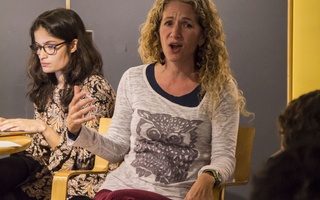In a major break from the University’s newly centralized approach to handling sexual harassment, Harvard Law School has adopted a new set of procedures that, if approved by the federal government, will incorporate a school-specific Title IX unit to investigate its own student sexual harassment cases and offer legal counsel to all parties involved.
When Harvard unveiled its first-ever University-wide policy and accompanying procedures to address sexual harassment this summer, University President Drew G. Faust and other officials praised them as centralizing Harvard’s management of the issue, although they have drawn criticism from some professors at the Law School. The policy established a definition of sexual harassment to apply to all of Harvard’s schools, and the procedures created a central office, the Office for Sexual and Gender-Based Dispute Resolution, to investigate complaints against students across the entire University in an effort to bring consistency to the process.
If the Law School’s new procedures are implemented, however, the University’s approach to investigating sexual harassment complaints against students will no longer be consistent across all of its schools.
While the Law School, under new pending procedures it adopted Dec. 18, will continue to follow the University’s sexual harassment policy and definition, it has opted to create its own set of procedures for investigating alleged policy violations in lieu of the University-wide process. They are not yet implemented because the Department of Education’s Office for Civil Rights must first approve them, as part of an agreement administrators entered with the government after it found the Law School in violation of Title IX late last month.
{shortcode-49208e260746e0c69278c0bd39894289ad222c2d}
The pending procedures, which administrators have submitted to OCR for review, were posted on the Law School’s website this week. A set of interim procedures, which the Law School implemented in September to comply with the new University-wide policy and procedures, are currently in place.
Under the pending procedures, instead of reporting student sexual harassment complaints to ODR for investigation, the Law School will conduct investigations in-house, by or under the supervision of their own Title IX unit, consisting of a Title IX coordinator and two deputies. Both complainants and respondents may consult with advisers, including an attorney, throughout the process; the procedures stipulate that the Law School “will provide financial assistance to parties unable to afford an attorney who would like to do so.”
Under the University-wide procedures, personal advisers from the University, including academic advisers, may advise students throughout the investigation process, but cannot speak for their advisees. Attorneys are barred from submitting statements for students, although students are “advised” to consult with a lawyer if a complaint has criminal consequences.
{shortcode-331fc07a6a2e7deeea4b85a4a0cb874046c1f6dd}
According to its new, pending procedures, after the Law School Title IX Unit has determined that the respondent may have violated the University’s sexual harassment policy, an adjudicatory panel composed of three trained professionals unaffiliated with Harvard will issue a final decision. The panel will also hand down any appropriate sanctioning, which may range from warnings to expulsion.
This process differs from the University-wide procedures, in which a professional ODR investigator and a designee from the school investigate the case and determine whether a policy violation occurred before leaving the individual school to hand down sanctions.
Also unlike the University-wide process, the Law School’s pending procedures incorporate hearings into the adjudication process if any party in the case desires one. While the adjudicatory panel will determine the exact “conduct of the hearing,” the parties—with each up to two advisers, one of whom may be an attorney—will have an “equal opportunity” to respond to results of the investigation and to present witnesses and evidence, although they “may not directly address each other” during the hearing.
The new procedures also allow for each party to “request an impartial appeal,” which will be decided by trained Law School faculty members on its Administrative Board, rather than the original adjudicatory panel.
A committee composed of tenured faculty members will oversee several aspects of the new procedural process, including investigation methods and “reasonable regulations for compensation of attorneys on behalf of students,” according to the pending procedures.
A DEPARTURE FROM CENTRAL
Read more in University News
Video: Top 10 Stories That Shaped 2014Recommended Articles
-
 Central Office To Hear FAS Faculty Sexual Harassment Cases
Central Office To Hear FAS Faculty Sexual Harassment Cases -
 Law School Appoints Title IX Committee
Law School Appoints Title IX Committee -
Letter to the EditorsHad there been a representative faculty senate, that senate could have insured faculty participation in the creation of these new regulatory standards.
-
 After Federal Feedback, Law School Implements New Title IX Standards
After Federal Feedback, Law School Implements New Title IX Standards -
 Harvard Law School Launches Student Life App
Harvard Law School Launches Student Life App













